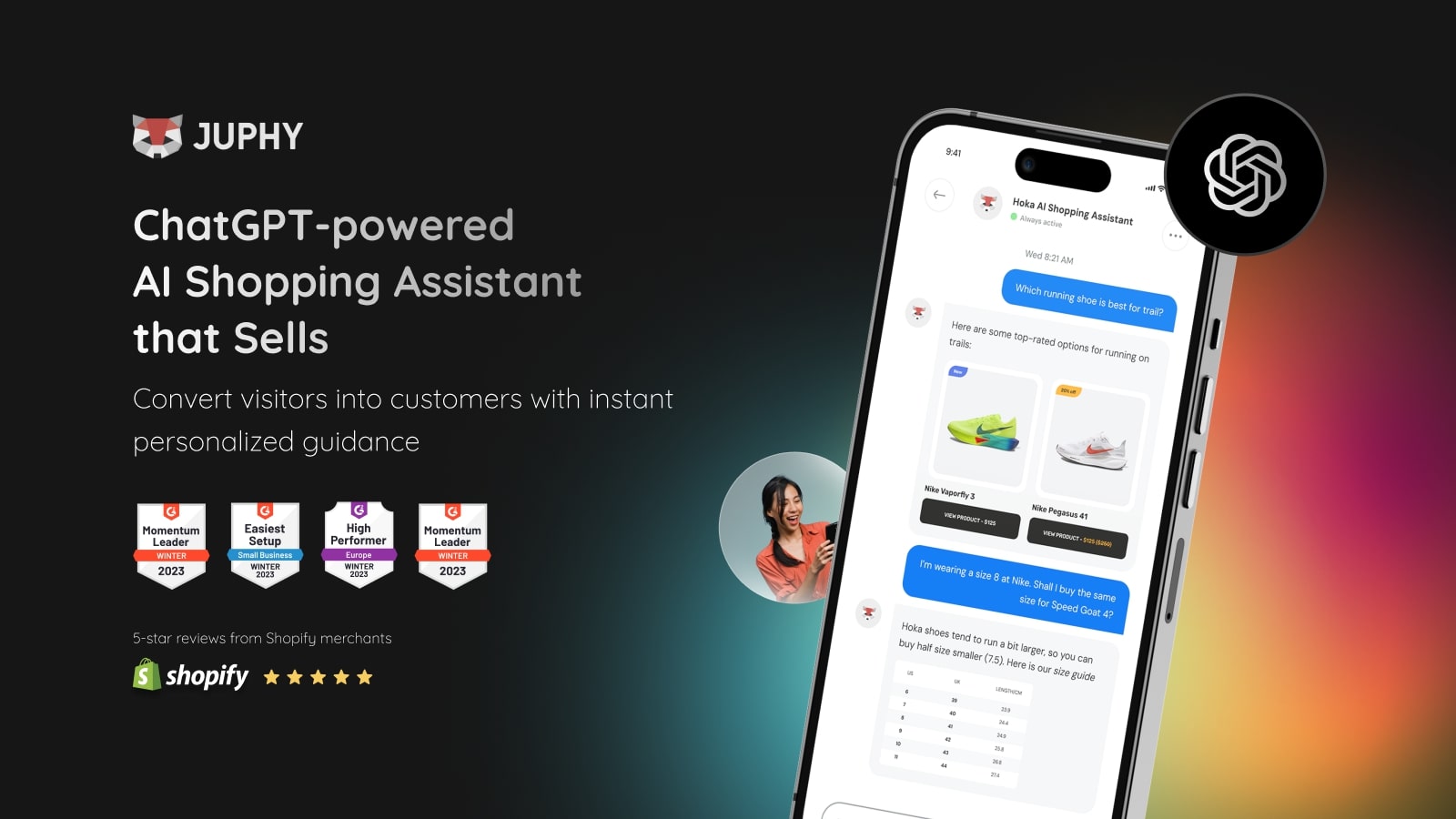Juphy’s Weekly E-Commerce News Express – 03-07 June 2024
Ceyda Duz
Welcome to this week’s e-commerce & AI news episode, your source for the latest trends and insights! Dive into the evolving dynamics of online and physical retail, uncovering strategies shaping the industry. From the challenges confronting UK retailers to exciting product updates from Pinterest, Rakuten, and Logie, this week’s guide covers all the topics you need to know to stay up-to-date!

E-Commerce Growth and Physical Store Importance
E-commerce is showing promising growth for the future and strengthening its popularity with its convenience, as shown by a recent study by Forrester that projects that global e-commerce will increase from $4.4 trillion in 2023 to $6.8 trillion by 2028. This growth is going to capture 24% of global retail sales. However, despite the popularity of e-commerce and consumers’ favor towards it, physical stores are not losing dominance. Forrester also states that physical stores will continue to dominate, with $21.9 trillion of the $28.7 trillion worldwide retail sales in 2028 still occurring in-store. This not only underlines the importance for brands to invest in physical retail alongside their online efforts but also to focus on both their online stores as well as physical stores.

The same study also forecasts significant growth in global e-commerce by 2028 due to the rise of online marketplaces, social commerce, and livestream selling:
- In the US, online retail sales are expected to hit $1.6 trillion by 2028, making up 28% of total US retail sales.
- In Canada, online sales will reach $83 billion by 2028.
- Online retail sales in Latin America’s top six countries (Brazil, Mexico, Argentina, Colombia, Peru, and Chile) will grow to $192 billion by 2028.
- Western Europe’s online retail sales are anticipated to rise from $508 billion in 2023 to $773 billion by 2028.

Despite the growth of e-commerce, the retail landscape is facing significant challenges. UBS reports that as many as 45,000 retail stores in the US might close, with sectors like apparel, consumer electronics, and home furnishings being the hardest hit. But even with these closures, physical retail remains vital. Successful retailers are those that integrate online and physical channels to offer seamless, engaging shopping experiences.
Ultimately, while e-commerce continues to grow, retailers must adopt a holistic approach to retail. By creating complementary online and physical brand experiences, retailers can enhance their ecosystems and deliver seamless customer experiences. Those who fail often overlook the integration of online services and the importance of personalized, engaging shopping experiences for younger consumers.
UK Retailers’ Delivery and Service Issues
A recent study by fulfillment company Salesupply and ParcelLab reveals significant gaps in the post-purchase experience among the top 100 online retailers in the United Kingdom.
The key findings of the study include:
- Delivery Information: 50% of these retailers do not display delivery information on product pages, impacting customer satisfaction. Moreover, nearly half of those who do fail to meet their advertised delivery times, emphasizing the need for reliable delivery to retain customers.
- Tracking Transparency: Only 55% of retailers provide a tracking link from their carrier, leaving 45% without this transparency, which can lower trust.
- Express Delivery Options: While 80% of retailers offer express delivery, almost 20% always charge for delivery, with an average shipping cost of £4.13.

- Customer Service Hours: One in four major online sellers only offer customer support during business hours, risking customer loss to competitors available during peak shopping hours, which are out of office hours.
- Response Times: 50% of retailers took more than five minutes to answer a call, with an average waiting time of 8.23 minutes. Email responses averaged 12 minutes, social media 10 minutes, and WhatsApp 15 minutes.
- Chatbots Usage: 66% of retailers use chatbots to improve efficiency and customer satisfaction.
In light of these key findings, it seems that there is a critical need for UK retailers to improve their delivery reliability and customer service to meet customer expectations and maintain their business. Today’s customers and consumers expect retailers to deliver exceptional service that’s why it’s important to keep those findings in mind and view them as guides toward business success.
Pinterest & Shopify Support Marginalized SMBs

Pinterest has expanded its Inclusion Fund by partnering with Shopify’s Build Black and Build Native initiatives. This collaboration aims to support small businesses, independent publishers, and boutique creator agencies from historically marginalized communities, providing them with resources and opportunities to thrive in the digital marketplace.
Rakuten’s Rakuten+ Membership Program
Rakuten, the Tokyo-based cash-back shopping platform, has unveiled Rakuten+, a membership initiative aimed at connecting designer brands with Rakuten’s highly engaged members. Through Rakuten+, designer brands gain access to a select group of loyal and active shoppers, offering them enticing benefits such as a minimum of 10% cash back on participating brands and retailers year-round. This program presents a valuable opportunity for designer brands to expand their audience and foster deeper connections with high-value shoppers.

Logie’s AI Tools for Brand-Influencer Collaborations

Logie, the AI-driven platform specializing in brand-influencer partnerships, has introduced new tools tailored for Amazon Prime Day campaigns. Utilizing advanced AI capabilities, Logie’s platform intelligently matches brands with the most suitable influencers based on audience relevance, brand affinity, and content style. This ensures that brands collaborate with creators who can deliver impactful campaigns aligned with their objectives. Additionally, Logie empowers influencers by providing access to brand collaborations within their niche, fostering mutually beneficial partnerships.
Deliver Unforgettable Customer Experiences with Juphy AI
In today’s digital landscape, customer expectations are higher than ever. They crave not just a seamless online shopping journey but also personalized assistance and instant support similar to an in-store experience. That’s where Juphy AI comes in – your solution to creating unparalleled customer satisfaction. Designed specifically for Shopify stores, Juphy’s AI Agent redefines the online shopping experience, mirroring the warmth and attentiveness of an in-person visit.
How? With the power of ChatGPT, Juphy AI provides personalized product recommendations and round-the-clock customer support, ensuring your customers feel valued and supported at every step of their journey. From assisting with product queries to guiding through sizing concerns and post-purchase inquiries, Juphy AI excels in delivering detailed and immediate responses, enhancing customer satisfaction and loyalty.
Embrace Juphy’s AI Agent today and elevate your customer experience to new heights: apps.shopify.com/juphy

Key Takeaways
E-Commerce vs. Physical Stores: Forbes discusses the promising growth of e-commerce, projected to reach $6.8 trillion globally by 2028. Despite this, physical stores are expected to continue dominating retail sales, underlining the importance for brands to invest in both online and offline retail channels.
UK Retailers’ Delivery & Service Issues: Salesupply and ParcelLab’s recent study reveals significant gaps in the post-purchase experience among the top 100 online retailers in the UK. Issues include a lack of delivery information, tracking transparency, and limited customer service hours.
Pinterest & Shopify Support SMBs: Pinterest partners with Shopify’s Build Black and Build Native initiatives to expand its Inclusion Fund, aiming to support small businesses and creators from historically marginalized communities.
Rakuten’s Rakuten+ Membership Program: Rakuten launches Rakuten+, a membership initiative connecting designer brands with highly engaged members. This program offers benefits such as cashback on participating brands, providing designer brands with opportunities to expand their audience.
Logie’s AI Tools for Brand-Influencer Collaborations: Logie introduces AI-driven tools tailored for Amazon Prime Day campaigns, facilitating brand-influencer partnerships. Through matching based on audience relevance and content style, Logie helps brands collaborate with suitable influencers for campaigns aligned with their objectives.

